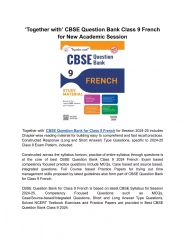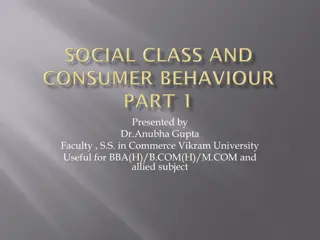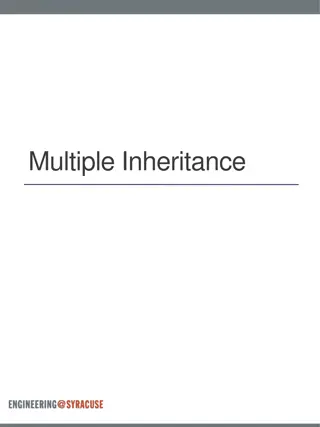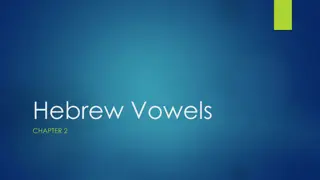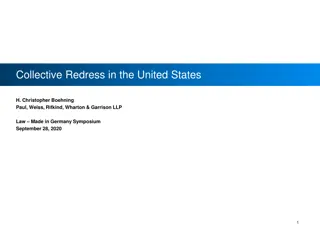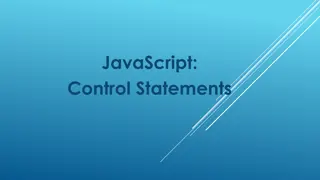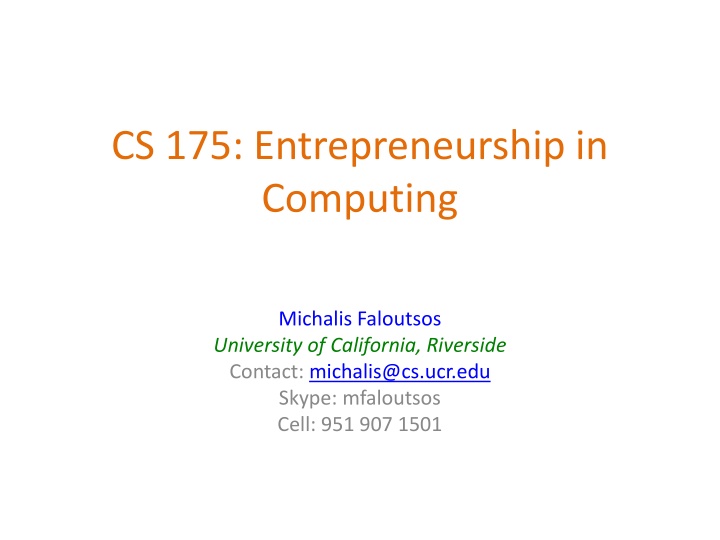
Entrepreneurship in Computing Class Overview
"Explore the Entrepreneurship in Computing class taught by Prof. Michalis Faloutsos at the University of California, Riverside. Learn how to turn software ideas into successful businesses, covering topics like starting a business, pitching ideas, market analysis, funding, and more. Gain insights into the instructor's qualifications, expectations, logistics, and evaluation criteria for the course."
Download Presentation

Please find below an Image/Link to download the presentation.
The content on the website is provided AS IS for your information and personal use only. It may not be sold, licensed, or shared on other websites without obtaining consent from the author. If you encounter any issues during the download, it is possible that the publisher has removed the file from their server.
You are allowed to download the files provided on this website for personal or commercial use, subject to the condition that they are used lawfully. All files are the property of their respective owners.
The content on the website is provided AS IS for your information and personal use only. It may not be sold, licensed, or shared on other websites without obtaining consent from the author.
E N D
Presentation Transcript
CS 175: Entrepreneurship in Computing Michalis Faloutsos University of California, Riverside Contact: michalis@cs.ucr.edu Skype: mfaloutsos Cell: 951 907 1501
Overview of the class Purpose: How to turn an idea/software into a business Create a few new companies by end of quarter Syllabus Covers most aspects of a creating a business Assumes: You are deeply interested, willing to work Note: it counts as tech elective 2
Topics 1. Starting a business: Identify an idea (Kaw: 1,2,4 Barr: 1,2,3) 2. Pitching a business idea (Kaw: 3 Barr: 11) 3. Market analysis and Goto Market strategy (Kaw: 8, 9, 10 Barr: 6) 4. Operational issues (Kaw: 5) 5. Funding (Kaw 7) 6. Networking: knowing people 7. Forming a business 8. Recruiting and hiring (Kaw 6) 9. Financial: analysis and projections (Barr 10) Our textbooks: Kaw: Kawasaki, G., The art of the start, Portfolio Inc. Barr: Barringer, B. R., Preparing effective business plans: An entrepreneurial approach Pearson/ Prentice Hall, 2009 3
1. Am I qualified to teach this? Michalis Faloutsos Prof of CS, networks and security Director of Entrepreneurship for the campus I have done well in research 150 papers, Google H-index ~55, >$12M in grants Have never taken a business course I have read some business books 4
2. Am I qualified to teach this? Started two companies StopTheHacker, sold in 2013 Programize, alive and kicking I have street-cred: I am in the advisory board of 3 startups I advise 1 entrepreneur every 2-3 weeks I am the Director of Entrepreneurship at UCR 5
What I expect from you Be seriously interested Behave professionally Be communicative Be proactive Devote the time Act with urgency Show up for classes and participate 6
Logistics We will use iLearn You need to check your UCR emails I will treat you like adults Participation is required 7
Evaluation 20% Assignments partial progress report 10% Reading 15% Final presentation 15% Final binder of project 30% Working prototype 10% Participation attendance Modulated by your contribution to the team 8
Forming groups and projects Send me one email per group Names and emails of all, quick description Description of project or ideas in consideration Send me an email if you trying to form a group I will need to ensure everybody is in a group 9
Questions? 10
Need to do asap Order the books, and start reading Form teams Identify ideas The books can help Consider also a data-driven startup https://datafinder.com/api/overview From UCR alumn Kevin Marcus 11
Elevator pitch 1 9,000 websites are compromised every day according to Google. StopTheHacker protects the reputation and safety of websites with a comprehensive suite of SaaS services. StopTheHacker's award winning technology can detect never-before-seen malware using Artificial Intelligence techniques. The technology has received two awards from the National Science Foundation. StopTheHacker establishes partnerships in the hosting and IT services arena, who benefit by: (1) increasing their revenue by reselling or profit-sharing, (b) protecting their customers sites, (c) reducing the cost of managing the infrastructure. 13
Elevator pitch 3 We are AntiVirus for one's website offered as a SaaS solution. We detect and remove web-based malware, and have the best technology (according to several hosters who compared us with competitors) for detecting malware already on websites. We can detect zero-day outbreaks by using advanced Artificial Intelligence techniques. Our traction and revenue validate the opportunity. The services cater to an untapped market, since they are complementary to, but different from, firewalls, anti-spam, anti-virus, and web-access filtering services. Recently, STH has established partnerships with Parallels and other big players in the hosting space and exploring partnerships with large security companies. 14
Elevator pitch 2 StopTheHacker (STH) has developed and deployed a SaaS platform for remotely scanning, monitoring, and protecting websites and online social network profiles and their visitors from malware and malicious content. The technology reduces the risk of downtime and lost revenue to website operators due to blacklisting by search engines and service providers such as Google, Yahoo!, Bing, Paypal etc. Once blacklisted a site may be inaccessible by browsers for more than week. Each day, over 9,000 new websites are blacklisted by Google. For social networks, owners protect themselves and their friends from malicious links and identity theft. The services cater to an untapped market, since they are complementary to, but different from firewalls, anti-spam, anti-virus, and web-access filtering services. Recently, STH has established partnerships with Parallels and other big players in the hosting space. STH has been generating revenue from its SaaS services from hosters, with promising numbers: up to $72K per year service fee paid by hosters, 4000 end-user signups in a span of 6 months from a one partner. Our vision: a. Dominate the hosting space by becoming the go-to security partner for web-malware detection b. Expand to the enterprise space via security VARs c. Innovate by detecting malware in Social Networks (Facebook is the new web) 15








